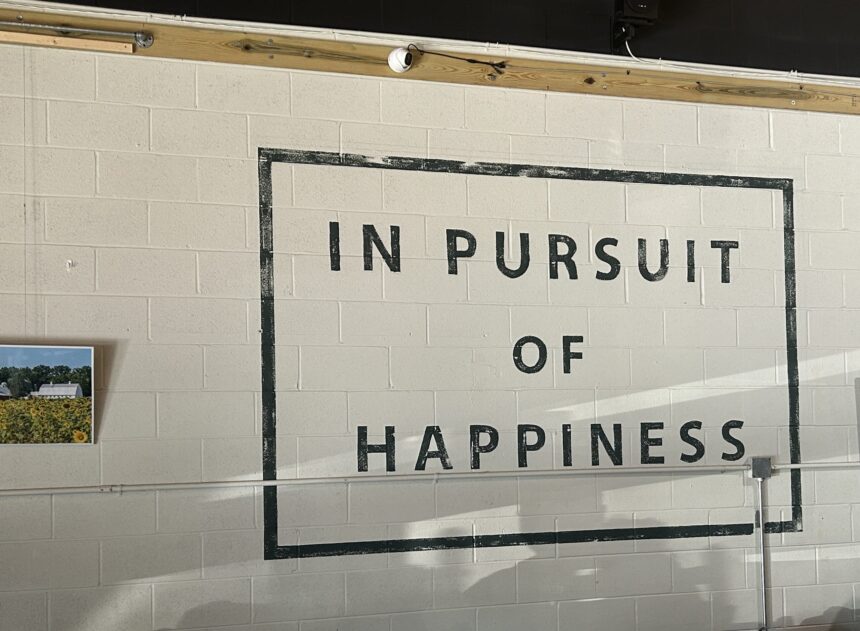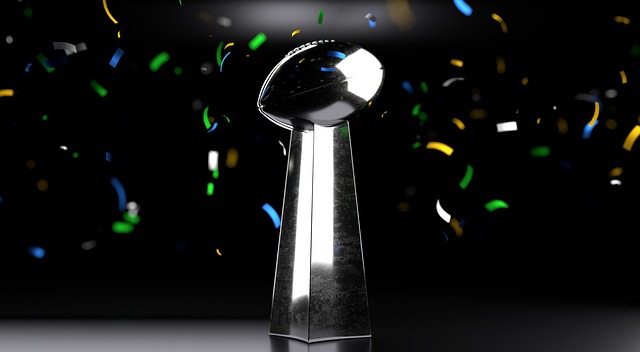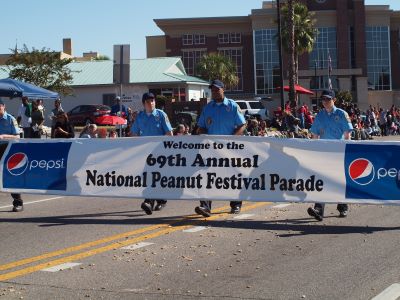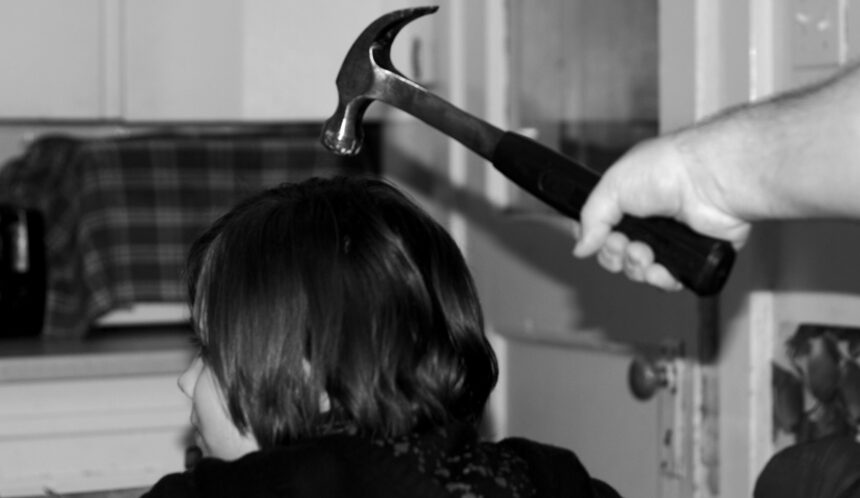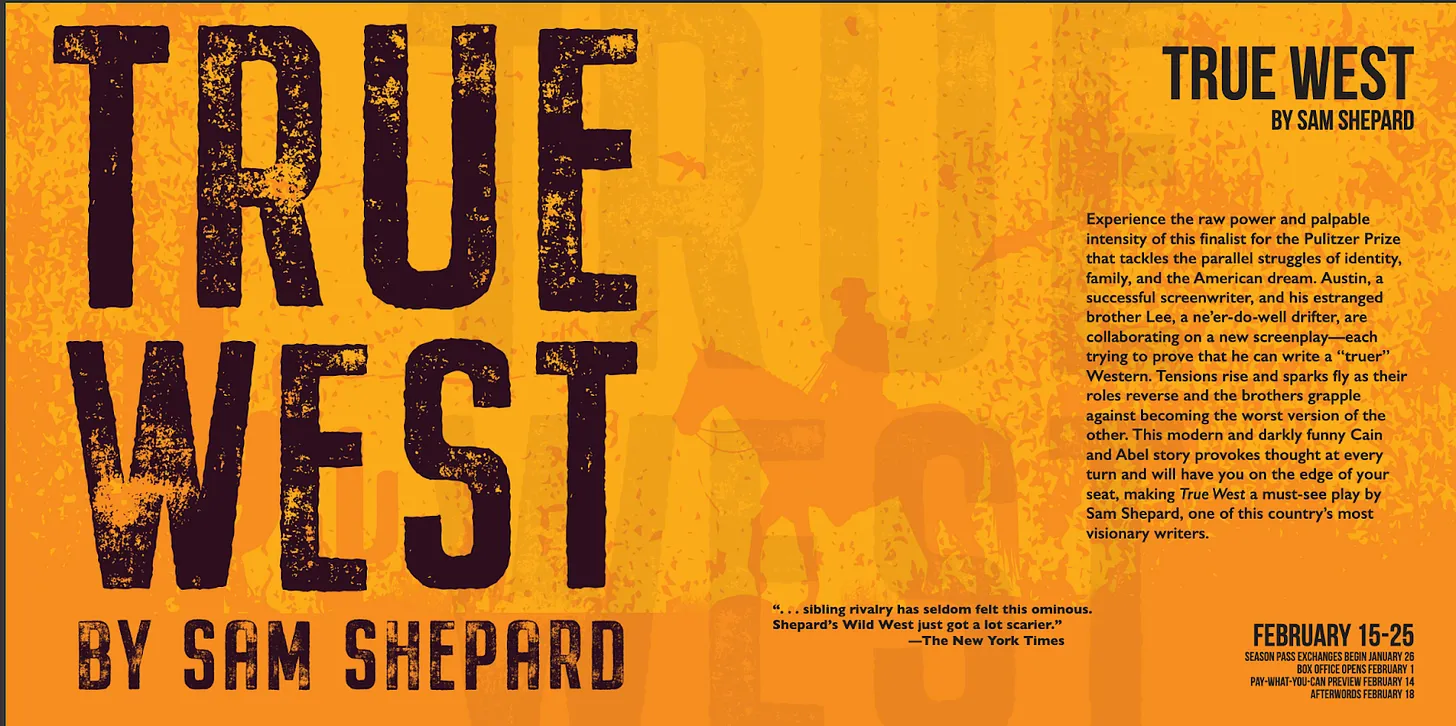
Two brothers, a screenplay, and a modern-day conflict. An American classic comes to University of Mary Washington Theater.
TRUE WEST
by Sam Shepard
Mary Washington University Theatre
Directed by Gregg Stull
Performances February 15- 25
Tickets
Reviewed by Dennis Wemm
Lee is a drifter, a scalawag, an opportunistic outsider. His only source of income seems to be looting people’s houses while they’re away. He doesn’t want or care about anyone’s approval. He’s irritated by his brother Austin, who has success, money, and a stable home life.
Austin is a straight up, married, Ivy League screenwriter with kids. He finds himself out of touch with showbiz and his audience. He’s an outsider who really wants to be inside the system, with fame and fortune. Austin “has it all” but he seems stuck. Deep down he longs to be wild, free, and independent.
Both are driven. Both care about little else than making their lives succeed on their own terms. Formula for a drama: take these two guys, place them in a neutral territory, and make them try to tell the story of the American West (ineptly). They turn into Cain and Abel, looking for a god to smile down on them. Will one of them win? Which one? That god is the myth of “The West.”
That’s a really big concept, and Sam Shepard’s play, True West, doesn’t offer an easy answer. Shepard observes his characters without outlining an easy answer. It’s a wild ride. It becomes a tragicomedy of errors.
Lee and Austin meet unexpectedly in their mother’s Southern California kitchen. (An early 80’s kitchen that started a lot of audience discussion-and nostalgia-before the lights came up on the action.) Mom’s away in Alaska, and Austin is watching the place. Lee, the human coyote, is scouting the neighborhood to scavenge for easy small appliances. Austin is deep into “research” for his new screenplay. It’s a good excuse for not writing.
Lee taunts Austin. Austin judges Lee. The action spins up when Saul Kimmel enters. Saul is a producer who’s leading Austin along in the development of a new screenplay. Saul rejects and deflects. Austin wants to write FILMS and Saul wants to produce MOVIES.
Lee sees Saul’s game. He enters it by offering Saul a MOVIE idea–a modern Western with a revenge plot (and horses). He pitches it to Saul, and Saul takes the bait. Lee and Saul agree to play golf on it. Austin is left in the cold.
Following the golf game next morning, Lee returns with an agreement for an advance on a script. Lee can’t write. He can’t spell. He doesn’t know how to type. Or how a typewriter works (a long slow burn of hilarity). Lee has a vision for the movie that fascinates and repels Austin, but he does have a vision. They agree with Saul to work together.
They have a heart-to-heart moment (actually, several very effective ones). Lee romanticizes their father, a life-long drifter. He’s trying to fit a mold. Austin gets him to see that their father is headed for slow, agonizing self-destruction. In a Disney movie it would lead to a happy melding of them into one formidable writer. Sam Shepard doesn’t write for Disney.
This play has worked its way into the American canon of classics. What does University of Mary Washington’s production add to it?
Michael Mason Clark as Austin clearly fights to remain civilized in the face of savagery. You can see each decision; that’s Clark doing effective acting. The subtext is there in his face even though his verbal responses say differently. He talks the talk, but doesn’t really believe it.
Seth Drenning as Lee is a fighter. He will not leave anything unchallenged and on his surface he hates hypocrisy. Until he sees it means success. Then hypocrisy becomes his middle name. He keeps trying to remove civilization like he loses his shirt. He’s still upset that the coyotes surrounded by civilization yelp and yip rather than howling like they would in the desert. Lee likes to howl.
Nathaniel Huff’s Saul is not a nice guy, even though his bright Miami Vice-like ice-cream outfits proclaim him to be nice. He’s all veneer. He’s the ultimate user who looks for other peoples’ ideas, options them, and turns them into his own money. When Austin says that Lee might need an agent to work out deals in his favor, Saul claims that job as well–he will control the work of both brothers and take all the cash.
The fourth character, the brothers’ Mom (Maddie Baylor), comes home in Act II. If you want her to solve the existential problems the brothers face, well, she won’t. She ain’t that kind of Mom.
Costuming is simple and iconic. The act of dressing and changing pieces becomes a ritual act that sets up each moment of the play. The costumes (by Kevin McCluskey), as well as the set (by Bridgette Dennett) evoke a magical cusp between the 70’s and the 80’s culture. Lee puts on shoes and a button-down shirt for the golf game, Austin manfully armors himself with a tie in preparation for the meeting with Saul. Mom is an icon of the period.
The set is built to divide the stage, and to safely survive the violence that erupts between the brothers. Director Gregg Stull uses it masterfully to provide a series of fitting and evocative stage pictures. It illustrates Mom and introduces her long before her appearance onstage. Can we say Harvest Gold?
The inevitable physical violence depicted, directed by Casey Kaleba, gives a very scary look into the brothers’ real inner battles through their abuse of each other. No spoilers here!
Properties and set dressing are meticulous and functional. They are accurate, and also frequently hilarious, especially when endangered.
Like all brilliant but realistic lighting, the visual shifts are smooth and evocative.
True West is an exciting and enigmatic experience that you should have. It continues through February 25 at Klein Theatre in Du Pont Hall.
Dennis Wemm started directing at age 17 and didn’t stop until he retired three years ago. He loves his new home in Fredericksburg where theatre is an art, a community, and a diversion.


